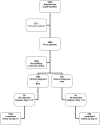Influence of rapid malaria diagnostic tests on treatment and health outcome in fever patients, Zanzibar: a crossover validation study
- PMID: 19399156
- PMCID: PMC2667629
- DOI: 10.1371/journal.pmed.1000070
Influence of rapid malaria diagnostic tests on treatment and health outcome in fever patients, Zanzibar: a crossover validation study
Abstract
Background: The use of rapid diagnostic tests (RDTs) for Plasmodium falciparum malaria is being suggested to improve diagnostic efficiency in peripheral health care settings in Africa. Such improved diagnostics are critical to minimize overuse and thereby delay development of resistance to artemisinin-based combination therapies (ACTs). Our objective was to study the influence of RDT-aided malaria diagnosis on drug prescriptions, health outcomes, and costs in primary health care settings.
Methods and findings: We conducted a cross-over validation clinical trial in four primary health care units in Zanzibar. Patients of all ages with reported fever in the previous 48 hours were eligible and allocated alternate weeks to RDT-aided malaria diagnosis or symptom-based clinical diagnosis (CD) alone. Follow-up was 14 days. ACT was to be prescribed to patients diagnosed with malaria in both groups. Statistical analyses with multilevel modelling were performed. A total of 1,887 patients were enrolled February through August 2005. RDT was associated with lower prescription rates of antimalarial treatment than CD alone, 361/1005 (36%) compared with 752/882 (85%) (odds ratio [OR] 0.04, 95% confidence interval [CI] 0.03-0.05, p<0.001). Prescriptions of antibiotics were higher after RDT than CD alone, i.e., 372/1005 (37%) and 235/882 (27%) (OR 1.8, 95%CI 1.5-2.2, p<0.001), respectively. Reattendance due to perceived unsuccessful clinical cure was lower after RDT 25/1005 (2.5%), than CD alone 43/882 (4.9%) (OR 0.5, 95% CI 0.3-0.9, p = 0.005). Total average cost per patient was similar: USD 2.47 and 2.37 after RDT and CD alone, respectively.
Conclusions: RDTs resulted in improved adequate treatment and health outcomes without increased cost per patient. RDTs may represent a tool for improved management of patients with fever in peripheral health care settings.
Trial registration: (Clinicaltrials.gov) NCT00549003.
Conflict of interest statement
The authors have declared that no competing interests exist.
Figures
Comment in
-
The role of rapid diagnostic tests in managing malaria.PLoS Med. 2009 Apr 28;6(4):e1000063. doi: 10.1371/journal.pmed.1000063. Epub 2009 Apr 28. PLoS Med. 2009. PMID: 19399160 Free PMC article.
References
-
- Bjorkman A, Bhattarai A. Public health impact of drug resistant Plasmodium falciparum malaria. Acta Trop. 2005;94:163–169. - PubMed
-
- Bojang KA, Obaro S, Morison LA, Greenwood BM. A prospective evaluation of a clinical algorithm for the diagnosis of malaria in Gambian children. Trop Med Int Health. 2000;5:231–236. - PubMed
-
- Chandramohan D, Jaffar S, Greenwood B. Use of clinical algorithms for diagnosing malaria. Trop Med Int Health. 2002;7:45–52. - PubMed
-
- Luxemburger C, Nosten F, Kyle DE, Kiricharoen L, Chongsuphajaisiddhi T, et al. Clinical features cannot predict a diagnosis of malaria or differentiate the infecting species in children living in an area of low transmission. Trans R Soc Trop Med Hyg. 1998;92:45–49. - PubMed
Publication types
MeSH terms
Substances
Associated data
LinkOut - more resources
Full Text Sources
Medical


